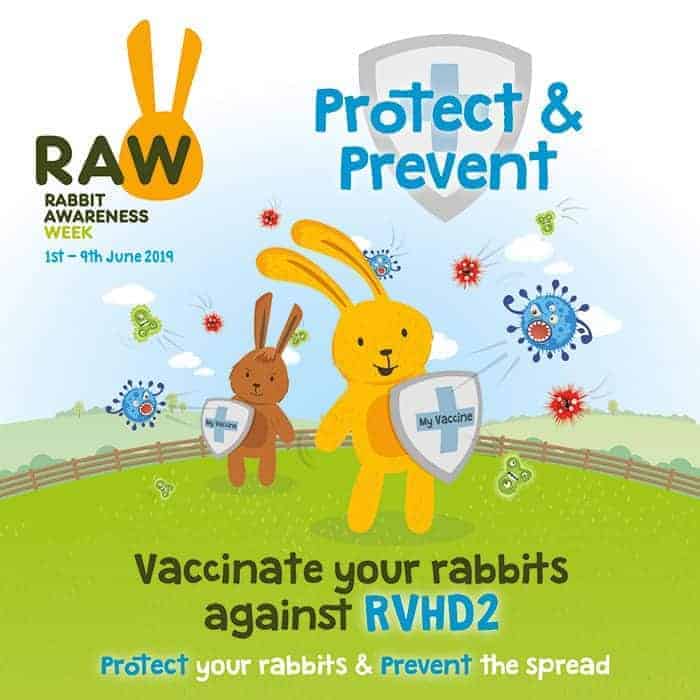
If you have pet rabbits and you haven’t heard of RVHD2 then it’s essential you keep reading. Rabbit viral haemorrhagic disease type two – or RVHD2 for short – is an extremely nasty infectious disease that has few symptoms and is fatal. With outbreaks reported all over the UK and Ireland, it poses a significant threat to our rabbit population. That’s why it’s absolutely vital that all pet rabbit owners across the UK – whether they have outdoor rabbits or house bunnies – must act now to protect their pets and prevent the spread of the disease.
What are the symptoms?
A big problem with RVHD2 is that it often has no symptoms. This means that it’s very hard to spot early on. Where symptoms do occur, they can be easily confused with other health conditions. They may include fever, lethargy, neurological signs, coma and blood clotting problems.
DID YOU KNOW?
RVHD2 is a new strain of the virus RVHD1, an extremely infectious virus that kills by causing internal bleeding. Cases of the RVHD2 were first reported in the UK in 2015. Symptoms are difficult to spot, but there is sometimes bleeding from body openings such as the nose, eyes and/or anus, but these are very easy to miss without daily checks.
How do rabbits catch it?
It is a myth that RVHD2 can only be caught through contact with an infected rabbit. In fact, the virus can be carried by:
- Birds and insects and their droppings
- The wind
- Soles of shoes, car tyres or other pets’ feet
- An infected rabbit or their droppings
- Owners’ hands or clothes
This is just a snapshot of the many different ways RVHD2 can be carried and transmitted. In reality, there’s no way to stop the virus getting into your rabbits’ indoor or outdoor environment.
What can I do to protect my rabbits?
The only way to protect your pets is through vaccination. Your vet can vaccinate your rabbits against RVHD2 (this is a separate vaccination to the combined myxomatosis/RVHD1 vaccine). Your vet will then advise what booster vaccinations your rabbit will need (usually every 6-12 months).
DID YOU KNOW?
According to the annual PAW Report, produced by animal welfare charity PDSA, almost half (49%) of rabbits have not been vaccinated with a primary course when young, which means there are around 490,000 unvaccinated rabbits in the UK. In addition, 58% have not had regular booster vaccinations.
If my rabbits do catch it, what could happen?
There is no specific treatment available for RVHD2, though your vet can offer supportive care. There have been some cases where rabbits have recovered from RVHD2. However, in most cases the disease is fatal. That’s why prevention through vaccination is absolutely vital.
Find out more about keeping your pet rabbits healthy with this really useful Rabbit Health Booklet, which you can download here
This year’s Rabbit Awareness Week takes place between 1-9 June 2019. This annual event engages rabbit rescues, vets, owners and bunny lovers across the UK help to raise awareness of rabbit welfare to give bunnies everywhere a better standard of living. Find out more at rabbitawarenessweek.co.uk.
Would you like to help us to help us save more rabbits’ lives? Please share!
If so, why not spread the word about Rabbit Awareness Week’s Protect & Prevent campaign. Share this information with your rabbit-loving friends so that their pets also get vaccinated against deadly diseases and follow the campaign on Facebook and Twitter.
If you found this interesting, you may also like:
The five things every bunny owner needs to know
We take a closer look at the five welfare needs of rabbits.
Happy bunnies?
What your rabbits need to be contented cottontails
Find out why it’s time to Move Away from Muesli
According to the annual PDSA Animal Welfare (PAW) Report, inappropriate diet has been consistently cited by veterinary professionals as the top issue that needs to be addressed for the UK’s rabbits.
Rabbits should eat a carrot a day and other bunny myths
Find out what you should feed your rabbit to ensure they have a diet that’s nutritionally right for them and their specialised digestive system…
Source: rabbitawarenessweek.co.uk














